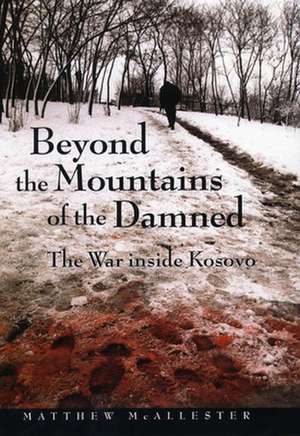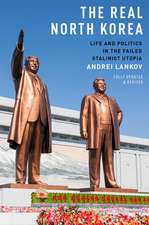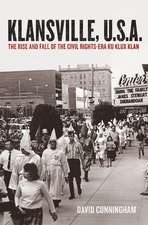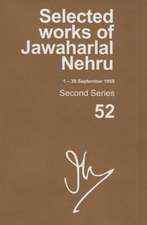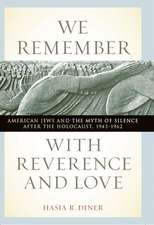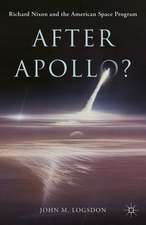Beyond the Mountains of the Damned – The War inside Kosovo
Autor Matthew Mcallesteren Limba Engleză Hardback – 11 dec 2001
| Toate formatele și edițiile | Preț | Express |
|---|---|---|
| Paperback (1) | 224.55 lei 6-8 săpt. | |
| MI – New York University – 31 oct 2003 | 224.55 lei 6-8 săpt. | |
| Hardback (1) | 525.42 lei 6-8 săpt. | |
| MI – New York University – 11 dec 2001 | 525.42 lei 6-8 săpt. |
Preț: 525.42 lei
Preț vechi: 682.36 lei
-23% Nou
Puncte Express: 788
Preț estimativ în valută:
100.55€ • 104.18$ • 83.92£
100.55€ • 104.18$ • 83.92£
Carte tipărită la comandă
Livrare economică 21 martie-04 aprilie
Preluare comenzi: 021 569.72.76
Specificații
ISBN-13: 9780814756607
ISBN-10: 0814756603
Pagini: 240
Ilustrații: 12 b&w illustrations, 8 pages with halftones
Dimensiuni: 152 x 229 x 15 mm
Greutate: 0.48 kg
Ediția:New.
Editura: MI – New York University
ISBN-10: 0814756603
Pagini: 240
Ilustrații: 12 b&w illustrations, 8 pages with halftones
Dimensiuni: 152 x 229 x 15 mm
Greutate: 0.48 kg
Ediția:New.
Editura: MI – New York University
Recenzii
Winner, Publishers Weekly Best Books of 2002, Non-Fiction "In badly constructed books, the reader doesn't care what happens on the next page. In well-constructed books, the reader can't wait to see what happens on the next page. This book is a rare, third kind: The reader dreads what will happen on the next page. Nevertheless, he feels compelled to read on. . . . McAllester takes the reader not only along the streets where atrocities have been committed but inside homes while they are happening. As is the case with many good reads, the power of such scenes comes from the order in which events are presented. First the author develops a character, then later in the book informs you about his fate. Or the author will describe how a family is brutalized, then describes, almost as an aside in the course of a succeeding chapter about his own adventures in war-torn Kosovo how he meets a traumatized eyewitness to the previous account. In this way, the reader becomes an observer not only of what was happening inside Kosovo during the NATO bombardment but of what was happening to McAllester himself and how he managed to assemble his book."
Washington Post "The power of McAllester's extraordinary book lies not in its comprehensiveness or its literary polish-though there are many brilliantly moving and perceptive passages-but in its shocking authenticity and deep moral concern. One gets the sense that he risked his life not simply to pursue a story, timely and important as it was, but because of the enormity of the evil being done and his conviction that, in a world of bland policy abstractions, what happened in those days inside Kosovo had to be told."
New Leader "McAllester powerfully concludes that a sickening mixture of greed, ethnic hostility, and wartime nihilism has displaced the healing power for love and reconciliation for the forseeable future. One of the most thoughtful accounts of the conflict in Kosovo to date conveyed with taut journalistic clarity that should ensure the book a broad range of readers."
Kirkus, Starred Review "This account is not of the virtual war that Westerners saw on their television screens but of the real effects on people who consider the ravaged area home."
Library Journal, Starred Review "McAllester's spare, understated prose is potent as is his exploration of the human side of geopolitics and war."
Publishers Weekly, Starred Review"In a twist that took McAllester as much by surprise as it will the reader, it appears that Isa Bala lived in that ill-defined world too, a world where people make deals and concessions just to survive another day. Perhaps he believed that through such compromises, his family would be safe. if so, he was tragically wrong."
Sunday Telegraph (London) "Beyond the Mountains of the Damned is a gripping, if depressing, account of what McAllester found among the ruins. . . . There is no bravado. . . . He offers vivid thumbnail sketches of Kosovar warriors in the field."
Newsday "McAllester offers us the kind of specific detail that we need to make other people's lives human to us. Even more importantly, he tells us how it is to be the oppressor, or at least one of the minions of the oppressors"
American Book Review
Washington Post "The power of McAllester's extraordinary book lies not in its comprehensiveness or its literary polish-though there are many brilliantly moving and perceptive passages-but in its shocking authenticity and deep moral concern. One gets the sense that he risked his life not simply to pursue a story, timely and important as it was, but because of the enormity of the evil being done and his conviction that, in a world of bland policy abstractions, what happened in those days inside Kosovo had to be told."
New Leader "McAllester powerfully concludes that a sickening mixture of greed, ethnic hostility, and wartime nihilism has displaced the healing power for love and reconciliation for the forseeable future. One of the most thoughtful accounts of the conflict in Kosovo to date conveyed with taut journalistic clarity that should ensure the book a broad range of readers."
Kirkus, Starred Review "This account is not of the virtual war that Westerners saw on their television screens but of the real effects on people who consider the ravaged area home."
Library Journal, Starred Review "McAllester's spare, understated prose is potent as is his exploration of the human side of geopolitics and war."
Publishers Weekly, Starred Review"In a twist that took McAllester as much by surprise as it will the reader, it appears that Isa Bala lived in that ill-defined world too, a world where people make deals and concessions just to survive another day. Perhaps he believed that through such compromises, his family would be safe. if so, he was tragically wrong."
Sunday Telegraph (London) "Beyond the Mountains of the Damned is a gripping, if depressing, account of what McAllester found among the ruins. . . . There is no bravado. . . . He offers vivid thumbnail sketches of Kosovar warriors in the field."
Newsday "McAllester offers us the kind of specific detail that we need to make other people's lives human to us. Even more importantly, he tells us how it is to be the oppressor, or at least one of the minions of the oppressors"
American Book Review
